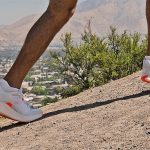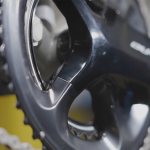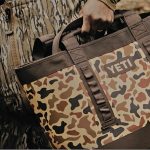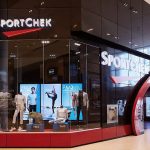Reebok International Ltd. reported net income for the fourth quarter ended December 31, 2003 of $28 million, or $.44 per diluted share, an earnings per share increase of 63% when compared to net income of $16 million, or $.27 per diluted share in the fourth quarter of 2002.
For the full year ended December 31, 2003, net income was
$157 million or $2.43 per diluted share, an earnings per share increase of 19% when compared with net income (before the cumulative effect at the beginning of the year of the adoption of the new accounting standard regarding goodwill) of $132 million or $2.04 per diluted share for the 2002 comparable period.
Net sales for the 2003 fourth quarter were $844 million, an
increase of 11% from 2002 fourth quarter net sales of $763 million. Foreign currency exchange rate fluctuations favorably impacted sales comparisons. On a constant dollar basis, fourth quarter sales increased approximately 6% over the prior year's fourth quarter sales.
For the Reebok Brand, worldwide sales in the 2003 fourth quarter increased 12% to $700 million compared to 2002 fourth quarter sales of $627 million.
In the U.S., sales for the Reebok Brand increased 13% in the fourth quarter of 2003 as compared with 2002's fourth quarter. Reebok's U.S. footwear sales in the fourth quarter of 2003 were $228 million, an increase of 17% when compared with 2002's fourth quarter U.S. footwear sales of $195 million. The Company's international sales of Reebok Branded products amounted to $316 million in the quarter, an increase of 10% over 2002's fourth quarter sales.
Sales of the Company's other brands; Rockport, Ralph Lauren
Footwear and The Greg Norman Collection, were $144 million in the
fourth quarter of 2003, compared with 2002's fourth quarter sales of
$136 million, an increase of 6% over 2002's fourth quarter sales.
Net sales for all of 2003 were $3.485 billion, an increase of 11%
from 2002 net sales of $3.128 billion. Worldwide sales for the Reebok
Brand in 2003 were $2.936 billion as compared with 2002's sales of
$2.592 billion, an increase of 13%.
The Company reported that its total worldwide backlog of open
customer orders scheduled for delivery from January 2004 through June
2004 for the Reebok Brand increased 13% from the prior year's
comparable amount. On a constant dollar basis, overall backlog for the
Reebok Brand increased 6%.
Paul Fireman, the Company's Chairman and Chief Executive Officer
said, “2003 was a solid year for our Company. We achieved our sales
and earnings targets despite the generally weak economic conditions
for most of the year in many of our key markets around the world. This
marks the fourth consecutive year of earnings improvement since we
embarked on our long-term strategic plan to re-energize the Reebok
Brand. Over that period of time we have strengthened the Brand's image
and visibility, improved the overall style and fashionability of our
products, solidified our retailer relationships and gained quality
market share in several strategic markets. One of our key strategic
objectives during 2003 was to invest in and grow the performance
categories of the Reebok Brand. We were successful in accomplishing
this objective by leveraging our relationships with athletes, teams
and federations and by developing successful business models for our
valuable partnerships with the National Football League “NFL” and the
National Basketball Association “NBA”. A key ingredient of our
initiative to enhance the performance credentials of the Reebok Brand
was the introduction of a new and improved collection of authentic
running products for athletes who demand nothing but the best. During
2003 we introduced our new Premier Series of running products. Since
we launched these new Premier products in Spring 2003, we have won
several awards from well respected industry sources validating our
commitment to designing and producing industry leading technical
running products. The initial success of our Premier Series running
products has been very encouraging, as the running category is the
largest single category of performance footwear around the world. In
addition to running, we successfully introduced a new line of men's
training products which are supported by our authentic on-field
positioning with the NFL and the NBA. Sales of performance footwear
products increased by 16% for the year, led by a 15% increase in the
running category and a 16% increase in the men's training category,”
Fireman said.
“Another key objective for 2003 was to continue the roll-out of
our new Rbk products and marketing to help strengthen the connection
between the Reebok Brand and younger consumers,” Fireman noted. “When
we launched our Rbk concept two years ago our intention was, as it is
today, to create a visible and recognizable extension of the Reebok
Brand worn by young athletes and supported by an integrated marketing
campaign fusing music, entertainment and sports. Our success in
launching the Rbk platform is very satisfying to us all. We proved
that we were able to create an entirely new marketing concept with
complementary products and successfully communicate it to consumers in
an impactful way over a relatively short period of time. During 2003
sales of our Rbk footwear products in the U.S. increased by 48% and
Rbk now comprises approximately 15% of all Reebok Brand U.S. footwear
sales. Rbk has helped to improve our market share in the important
athletic specialty channel in the U.S., driven by strong consumer
response to these new products and concepts. And during 2004 we are
planning to extend the reach of our Rbk concepts geographically as we
continue to invest in this marketing and product platform throughout
the world,” Fireman added.
“In addition to our investments in both Rbk and performance
products we continue to leverage our heritage in lifestyle athletic
footwear by advancing our Reebok Classic products to a new level.
During 2003 we successfully launched many new product extensions for
Reebok Classic products including the Classic Vista collection, the
Classic Fusion collection, the Sports Vibe collection, and Classic
derivatives which are updated interpretations of some of our more
traditional Classic models. Classic products have evolved into a
multi-faceted program serving consumers of all ages in many different
demographic groups. Sales of Reebok Classic products increased 18%
over the prior year,” Fireman noted.
“During 2003 we supported each of these product segments with
their own advertising and marketing campaigns. The Brand's “Sounds and
Rhythm of Sport” platform has been successful in integrating sports
and music and is connecting young consumers with Rbk. Our Classic
print campaign which began four years ago has been very successful in
helping to grow this key segment of our business,” Fireman added.
“And, we are aggressively marketing our performance products utilizing
many of our world class athletes in our “Wear the Vector. Outperform”
advertising campaign. Television and print ads supporting Rbk,
performance (Vector) and Classic products will run worldwide
throughout 2004.”
“Looking forward, our long-term goal is to be a market leader and
to continually enhance the quality, value and image of our brands.
During 2004 we will communicate the performance and aspirational
values of the Reebok Brand. We intend to carefully monitor and
allocate our key product launches to ensure that an appropriate amount
of product is in the market with the intention of generating healthy
retail sell-throughs. Our intention is to grow quality market share
during 2004 in both footwear and apparel. We will continue to invest
in brand building initiatives that we believe are necessary for the
long-term health of our brands. The signing of Yao Ming reinforces a
key strategic priority for Reebok to develop the footwear and apparel
market throughout Asia, a region that represents a significant
long-term growth opportunity. We will also be investing in
infrastructure improvements by making additional investments in our
supply chain and our information systems in order to support future
growth and profitability and to help us to improve our operating
margins,” Fireman said.
The Company reported that its gross margin for the fourth quarter
of 2003 was 38.2%, an improvement of 50 basis points when compared
with the gross margin of 37.7% in the fourth quarter of 2002. “During
the quarter, much of the margin improvement came from our U.S.
footwear business,” Fireman said. “For our U.S. footwear business,
returns and allowances declined year on year, as did the effect of
markdowns on products closed out during the quarter,” Fireman noted.
SG&A expense totaled $277 million, or 32.8% of sales in the fourth
quarter of 2003, as compared with last year's fourth quarter SG&A of
$256 million, or 33.6% of sales. “During the quarter we increased our
Reebok Brand advertising expenditure by 28% but we were able to
generate operating leverage as a result of efficiencies gained from
other areas of our business,” Fireman said.
Worldwide inventories at December 31, 2003 totaled $353 million,
compared to $400 million at December 31, 2002, a decline of $47
million or 12%. “We continue to emphasize the importance of strong
balance sheet management throughout the organization. Our inventory
reduction was achieved despite the improvement in our open order
position and the negative effects of currency on the comparison. Our
cash on hand amounted to $694 million at year end, giving us
significant financial flexibility to make the appropriate investments
to increase shareholder value,” Fireman continued.
The Company noted that it had purchased 2,461,900 shares of its
common stock for $80 million during the year.
“In conclusion, I am pleased with our overall results for the
year. Our goal with respect to 2004 is to grow our earnings in the
range of 15% and improve our earnings per share in line with the
consensus of current analyst estimates. We are planning for this
earnings improvement to come from a combination of revenue increases
in the mid single digit range and expansion of our operating margins.
I am confident that our experienced management team will execute our
strategic plans in 2004 which will focus on growing quality market
share for all of our brands,” Fireman concluded.
Three Months ended December 31,
2003 2002
Reported net sales $843,615,000 $762,842,000
Effect of change in foreign currency
translation -- 32,374,000
Constant dollar net sales $843,615,000 $795,216,000
Twelve Months ended December 31,
2003 2002
Reported net sales $3,485,316,000 $3,127,872,000
Effect of change in foreign currency
translation -- 139,666,000
Constant dollar net sales $3,485,316,000 $3,267,538,000
(1) Because of the significance of the Company's international
operations, the Company believes that disclosing sales in constant
dollars provides meaningful information to assist in understanding
the Company's sales results.
Reebok International Ltd.
Financial Summary
Three months ended December 31,
2003 2002
Net sales $843,615,000 $762,842,000
Net income $28,121,000 $16,492,000
Average basic shares 59,287,000 59,886,000
Average diluted shares (1) 68,018,000 68,448,000
Basic earnings per share $0.47 $0.28
Diluted earnings per share $0.44 $0.27
Year ended December 31,
2003 2002
Net sales $3,485,316,000 $3,127,872,000
Net income before cumulative effect of
accounting change (2) $157,254,000 $131,528,000
Cumulative effect of accounting change,
net of taxes (3) (5,070,000)
Net income (2) $157,254,000 $126,458,000
Average basic shares 59,323,000 59,478,000
Average diluted shares (1) 67,763,000 68,013,000
Basic earnings per share - before
cumulative effect of accounting change $2.65 $2.21
Cumulative effect of accounting
change (3) -- (.09)
------------ ------------
$2.65 $2.12
Diluted earnings per share - before
cumulative effect of accounting change $2.43 $2.04
Cumulative effect of accounting
change (3) -- (.07)
------------ ------------
$2.43 $1.97
Reebok International Ltd
THREE MONTHS ENDED DECEMBER 31,
(Amounts in millions except per share data)
CONDENSED CONSOLIDATED STATEMENTS OF OPERATIONS 2003 2002 (a)
Net sales $843.6 $762.8
Cost of sales 521.6 475.6
Gross Margin 322.0 287.2
% of Net sales 38.2% 37.7%
Selling, general and administrative expenses 277.0 256.0
% of Net sales 32.8% 33.6%
Interest expense, net 4.3 4.3
Other expenses, net 0.3 3.1
Income before income taxes and minority interest 40.4 23.8
% of Net sales 4.8% 3.1%
Income taxes 12.3 7.4
Income before minority interest 28.1 16.4
Minority interest - (0.1)
Net income $28.1 $16.5
Reebok International Ltd
TWELVE MONTHS ENDED DECEMBER 31,
(Amounts in millions except per share data)
CONDENSED CONSOLIDATED STATEMENTS OF OPERATIONS 2003 2002 (a)
Net sales $3,485.3 $3,127.9
Cost of sales (1) 2,147.1 1,930.2
Gross Margin 1,338.2 1,197.7
% of Net sales 38.4% 38.3%
Selling, general and administrative expenses 1,085.8 981.8
% of Net sales 31.2% 31.4%
Interest expense, net 17.4 14.5
Other expenses, net 0.8 5.9
Income before income taxes, minority interest
and cumulative effect of accounting change 234.2 195.5
% of Net sales 6.7% 6.3%
Income taxes 72.1 60.6
Income before minority interest and cumulative
effect of accounting change 162.1 134.9
Minority interest 4.8 3.3
Net income before cumulative effect of
accounting change 157.3 131.6
Cumulative effect of accounting change, net of
income taxes (2) - (5.1)
Net income $157.3 $126.5
Basic earnings per share - before cumulative
effect of accounting change $2.65 $2.21
Cumulative effect of accounting change (0.09)
------- ------
$2.65 $2.12
Diluted earnings per share - before accounting
change (3) 2.43 $2.04
Cumulative effect of accounting change (0.07)
------- ------
$2.43 $1.97
Reebok International Ltd
COMPARATIVE SALES ANALYSIS
THREE MONTHS ENDED DECEMBER 31,
(Amounts in millions except per share data)
REPORTED DOLLARS Change
2003 2002 2003/2002
Reebok:
U.S.A - Footwear $228.4 $194.9 17.2%
U.S.A - Apparel 155.1 145.4 6.7%
------ ------ -------
383.5 340.3 12.7%
International - Footwear 157.1 150.3 4.5%
International - Apparel 159.2 136.4 16.7%
------ ------ -------
316.3 286.7 10.3%
Reebok Worldwide - Footwear 385.5 345.2 11.7%
Reebok Worldwide - Apparel 314.3 281.8 11.5%
------ ------ -------
699.8 627.0 11.6%
Rockport 87.2 97.5 -10.6%
Other Brands 56.6 38.3 47.8%
Total Company $843.6 $762.8 10.6%
Footwear $514.9 $467.9 10.0%
Apparel 328.7 294.9 11.5%
Total Company $843.6 $762.8 10.6%
CONSTANT DOLLARS Change
2003 2002 2003/2002
Reebok:
U.S.A - Footwear $228.4 $194.9 17.2%
U.S.A - Apparel 155.1 145.4 6.7%
------ ------ -------
383.5 340.3 12.7%
International - Footwear 157.1 164.6 -4.6%
International - Apparel 159.2 151.4 5.2%
------ ------ -------
316.3 316.0 0.1%
Reebok Worldwide - Footwear 385.5 359.5 7.2%
Reebok Worldwide - Apparel 314.3 296.8 5.9%
------ ------ -------
699.8 656.3 6.6%
Rockport 87.2 100.5 -13.2%
Other Brands 56.6 38.4 47.4%
Total Company $843.6 $795.2 6.1%
Footwear $514.9 $485.2 6.1%
Apparel 328.7 310.0 6.0%
Total Company $843.6 $795.2 6.1%
Reebok International Ltd
COMPARATIVE SALES ANALYSIS
TWELVE MONTHS ENDED DECEMBER 31,
(Amounts in millions except per share data)
REPORTED DOLLARS Change
2003 2002 2003/2002
Reebok:
U.S.A - Footwear $1,036.3 $931.7 11.2%
U.S.A - Apparel 561.2 461.2 21.7%
------- ------- ------
1,597.5 1,392.9 14.7%
International - Footwear 702.5 645.9 8.8%
International - Apparel 636.5 552.8 15.1%
------- ------- ------
1,339.0 1,198.7 11.7%
Reebok Worldwide - Footwear 1,738.8 1,577.6 10.2%
Reebok Worldwide - Apparel 1,197.7 1,014.0 18.1%
------- ------- ------
2,936.5 2,591.6 13.3%
Rockport 361.0 385.6 -6.4%
Other Brands 187.8 150.7 24.6%
Total Company $3,485.3 $3,127.9 11.4%
Footwear $2,226.7 $2,060.8 8.1%
Apparel 1,258.6 1,067.1 17.9%
Total Company $3,485.3 $3,127.9 11.4%
CONSTANT DOLLARS Change
2003 2002 2003/2002
Reebok:
U.S.A - Footwear $1,036.3 $931.7 11.2%
U.S.A - Apparel 561.2 461.2 21.7%
------- ------- ------
1,597.5 1,392.9 14.7%
International - Footwear 702.5 711.8 -1.3%
International - Apparel 636.5 616.8 3.2%
------- ------- ------
1,339.0 1,328.6 0.8%
Reebok Worldwide - Footwear 1,738.8 1,643.5 5.8%
Reebok Worldwide - Apparel 1,197.7 1,078.0 11.1%
------- ------- ------
2,936.5 2,721.5 7.9%
Rockport 361.0 395.3 -8.7%
Other Brands 187.8 150.8 24.5%
Total Company $3,485.3 $3,267.6 6.7%
Footwear $2,226.7 $2,136.4 4.2%
Apparel 1,258.6 1,131.2 11.3%
Total Company $3,485.3 $3,267.6 6.7%
Reebok International Ltd
RECONCILIATION OF REPORTED TO CONSTANT DOLLAR SALES
(Amounts in millions except per share data)
THREE MONTHS ENDED DECEMBER 31, Change
2003 2002 2003/2002
Reported Dollars:
Footwear $514.9 $467.9 10.0%
Apparel 328.7 294.9 11.5%
Total Company 843.6 762.8 10.6%
Effect of Change in Foreign Currency
Translation:
Footwear - 17.3
Apparel - 15.1
- 32.4
Constant Dollars:
Footwear 514.9 485.2 6.1%
Apparel 328.7 310.0 6.0%
Total Company $843.6 $795.2 6.1%
TWELVE MONTHS ENDED DECEMBER 31, Change
2003 2002 2003/2002
Reported Dollars:
Footwear $2,226.7 $2,060.8 8.1%
Apparel 1,258.6 1,067.1 17.9%
Total Company 3,485.3 3,127.9 11.4%
Effect of Change in Foreign Currency
Translation:
Footwear - 75.6
Apparel - 64.1
- 139.7
Constant Dollars:
Footwear 2,226.7 2,136.4 4.2%
Apparel 1,258.6 1,131.2 11.3%
Total Company $3,485.3 $3,267.6 6.7%
Reebok International Ltd
ORDERS SCHEDULED FOR DELIVERY
Percentage
Change 2004/2003
For the period January 1 to June 30 Reported Constant
Dollars Dollars
U.S.A.:
Footwear + 8.4% + 8.4%
Apparel + 20.9% + 20.9%
Total Domestic + 10.4% + 10.4%
International
Footwear + 12.5% - 2.3%
Apparel + 20.1% + 5.3%
Total International + 16.1% + 1.2%
Total Reebok Brand
Footwear + 9.8% + 4.5%
Apparel + 20.4% + 9.7%
Total Reebok Brand + 12.9% + 6.1%















